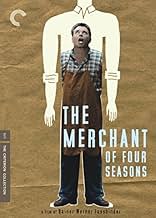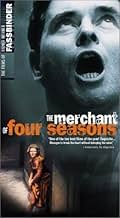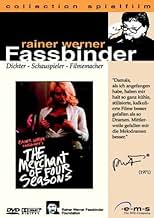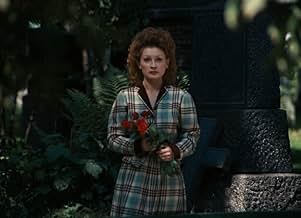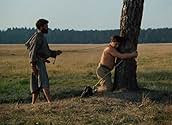El comerciante de las cuatro estaciones
Título original: Händler der vier Jahreszeiten
CALIFICACIÓN DE IMDb
7.3/10
5.5 k
TU CALIFICACIÓN
Hans Epp, un hombre con tendencias autodestructivas, busca significado a la vida vendiendo fruta sin conseguirlo, y su desafección se convierte en desesperación.Hans Epp, un hombre con tendencias autodestructivas, busca significado a la vida vendiendo fruta sin conseguirlo, y su desafección se convierte en desesperación.Hans Epp, un hombre con tendencias autodestructivas, busca significado a la vida vendiendo fruta sin conseguirlo, y su desafección se convierte en desesperación.
- Dirección
- Guionista
- Elenco
- Premios
- 3 premios ganados y 5 nominaciones en total
Walter Sedlmayr
- Fruit cart salesman
- (as Walther Sedlmayer)
El Hedi ben Salem
- The Arab
- (as Salem El Heïdi)
- Dirección
- Guionista
- Todo el elenco y el equipo
- Producción, taquilla y más en IMDbPro
Opiniones destacadas
The Merchant of Four Seasons received all major W German film awards for 1971 but it took a couple of more years for Fassbinder to break through internationally. TM4S is a fairly simple story but it can be difficult or painful to watch due to the subject matter: class prejudices, domestic violence, infidelity, family discord, depression and self-destructive behavior. In other words it presents a bleak view of the world and its human inhabitants. I believe there's an undercurrent of cutting humor throughout although it's interesting that no examples spring to mind and it's not campy. I saw TM4S in the mid-70s and in 2015 didn't remember much at all (other than not liking it), which suggests I repressed a lot that first time. I now think it's the first of a few masterpieces by a director whose importance will certainly endure.
THE MERCHANT OF FOUR SEASONS was Rainer Werner Fassbinder's first shot at mainstream acceptance. In a turbulent career of just fifteen years, he managed to create an astounding body of work in film and theater, both as a performer and a creative producer, actor, and director. Although this movie might not appeal to many viewers, the film has much to offer. The storyline is fairly straightforward. A man is ostracized from his upper middle class family due to emotional and economic problems, and proves unable to control his downward spiral. THE MERCHANT OF FOUR SEASONS is shot with a slavish devotion to elegant detail, and each set is very carefully designed and constructed. Every object on set seems painstakingly arranged so as to provoke layers of emotional texture. Many religious paintings and icons decorate the walls of the various rooms and seem to speak to Hans's desperate quest for spiritual meaning or direction in his life. Much thought was given to how lighting and color were employed to contrast and enhance the drama. Several times during the film, I froze the frame to marvel at the beauty of the shot's composition. I streamed this film, and the print was nearly flawless and second to none. Fassbinder employs his actors in an almost vehement "Anti-Natural' style. He does everything possible to prevent the actors from reacting in a normal or colloquial manner, and this creates a rather stilted effect. However, by doing so, he injects an almost 'hyper-reality' to the narrative. Rather than the presentation of a mundane melodrama, the actors almost militant lack of affectation forces the viewer to confront the film in a different manner. Fassbinder's film intentionally prevents the viewer from easily connecting with the characters' trials and tribulations. You are constantly on the outside, looking in. This will be a disconcerting experience for many, but I found it to be a unique and satisfying artistic adventure.
The Merchant of Four Seasons is a film about a lack of love. The film starts off with the main character; Hans Epp, returning from a spell in the foreign legion. He returns to his mother, not to be told how much she loves him, or how much she's missed him; but to be told that he is worthless and, even worse, that she would have preferred the man he went with to have come back instead. It is the character's relation to women that makes this film so hateful; the fact that his wife is taller than him is symbolic of his relation to the other gender; he is consistently humiliated by them, and it is through his relations with them that his life isn't as great as it could have been. This is also shown clearly by the way he treats his wife after a drink. He lost his job as a policeman through lust for a woman, and even his wife; a woman that is supposed to love him, never really shows any affection for him. Even at the end, his wife is more bothered about what her and her daughter will do than the state of her husband.
The Merchant of Four Seasons is a thoroughly unpleasant film. There isn't a scene in the movie where someone is happy, and not only that; but the movie seems deliriously blissful to wallow in the misery of it's central characters. The movie is certainly not recommended to anyone who is currently having a hard time, that's for sure. Despite all the misery, the film never steps out the bounds of reality; every event in this movie can - and most probably has - happened, and that only serves in making the movie more shocking. The film is, of course, helmed by Rainer Werner Fassbinder; the cult German director that committed suicide in 1982. This is only my second taste of the man's work, but through just two films, it is easy to get an idea of the type of art that he creates. Both films are downtrodden and gritty - yet realistic pieces of art. His characterization in this movie is subtle; we only ever get to know the characters through their plight's and not through their character. This is a very clever way of showing the audience that it is their surroundings that define the people in the film, not the people themselves - and as nearly everyone that sees the film knows what living in an urban society is like, it wont difficult for the majority of people to relate to.
The Merchant of Four Seasons is not a film that is easily forgettable; the movie is high on substance and low on style, and that makes for a very memorable picture, and one that everyone who considers themselves to be a fan of cinema should experience. It is with that in my mind that I give this film my highest recommendations; it's not sweet and it's not pleasant, but you will not see a more realistic portrayal of depression, and this is most certainly a movie that will stay with you.
The Merchant of Four Seasons is a thoroughly unpleasant film. There isn't a scene in the movie where someone is happy, and not only that; but the movie seems deliriously blissful to wallow in the misery of it's central characters. The movie is certainly not recommended to anyone who is currently having a hard time, that's for sure. Despite all the misery, the film never steps out the bounds of reality; every event in this movie can - and most probably has - happened, and that only serves in making the movie more shocking. The film is, of course, helmed by Rainer Werner Fassbinder; the cult German director that committed suicide in 1982. This is only my second taste of the man's work, but through just two films, it is easy to get an idea of the type of art that he creates. Both films are downtrodden and gritty - yet realistic pieces of art. His characterization in this movie is subtle; we only ever get to know the characters through their plight's and not through their character. This is a very clever way of showing the audience that it is their surroundings that define the people in the film, not the people themselves - and as nearly everyone that sees the film knows what living in an urban society is like, it wont difficult for the majority of people to relate to.
The Merchant of Four Seasons is not a film that is easily forgettable; the movie is high on substance and low on style, and that makes for a very memorable picture, and one that everyone who considers themselves to be a fan of cinema should experience. It is with that in my mind that I give this film my highest recommendations; it's not sweet and it's not pleasant, but you will not see a more realistic portrayal of depression, and this is most certainly a movie that will stay with you.
If I squint, I can see the influence of Douglas Sirk on this Rainer Werner Fassbinder soaper about fruitseller Hans Hirschmüller. He's cast as a failure, because he doesn't live up to the middle-class aspirations of his family. He runs away and joins the Foreign Legion. He returns and joins the police, but is kicked out for consorting with a prostitute. His one true love can't marry him because of his work, although she meets him for assignations. In between, he has a shrewish wife in Irm Hermann, in-laws who despise him, a heart attack, and his gradual erasure from his own life to contend with.
However, while Sirk's most famous work in the 1950s tinges his disapproval of the post-war middle class with sympathy and wonderment at peoples' refusal to admit what they want to to be happy, Fassbinder seems angry and contemptuous of his subjects. Hirschmüller is too passive, Miss Miss Hermann plays the victim card too aggressively, his family arrant, mealy-mouthed snobs, and so forth. There's no one to root for in this. There's nothing tragic about his inevitable destruction, only a sadistic, scolding examination of all that Fassbinder finds wrong with mainstream society.
However, while Sirk's most famous work in the 1950s tinges his disapproval of the post-war middle class with sympathy and wonderment at peoples' refusal to admit what they want to to be happy, Fassbinder seems angry and contemptuous of his subjects. Hirschmüller is too passive, Miss Miss Hermann plays the victim card too aggressively, his family arrant, mealy-mouthed snobs, and so forth. There's no one to root for in this. There's nothing tragic about his inevitable destruction, only a sadistic, scolding examination of all that Fassbinder finds wrong with mainstream society.
What kind I say about this movie. well for starters, I thought that this film was okay, not the greatest not worst. I said this cause I thought that the script was great and original, really different and refreshing. Now I wouldn't say that it's the greatest film that I've seeing cause of the acting. The actors that played each role, seems that they played them without emotions, as if they took the life out of them. When the wife laughed or cried, this didn't look real to me for some reason, that's just an example, but sincerely all the characters didn't act real at all. I wish I could say more positive things about this film so you guys can see it at least once but how can I do that since I know that I'm not going to see this movie again. I rented this film from the library of my school, without hearing anything about the film itself or the director. I took a chance because the story that was describe on the back sounded really interesting and it really was.
¿Sabías que…?
- TriviaAndrea Schober's debut.
- ConexionesFeatured in Sehnsucht nach Sodom (1989)
Selecciones populares
Inicia sesión para calificar y agrega a la lista de videos para obtener recomendaciones personalizadas
- How long is The Merchant of Four Seasons?Con tecnología de Alexa
Detalles
Taquilla
- Presupuesto
- DEM 325,000 (estimado)
- Total en EE. UU. y Canadá
- USD 8,144
- Fin de semana de estreno en EE. UU. y Canadá
- USD 11,623
- 16 feb 2003
- Total a nivel mundial
- USD 8,158
Contribuir a esta página
Sugiere una edición o agrega el contenido que falta

Principales brechas de datos
By what name was El comerciante de las cuatro estaciones (1972) officially released in India in English?
Responda


